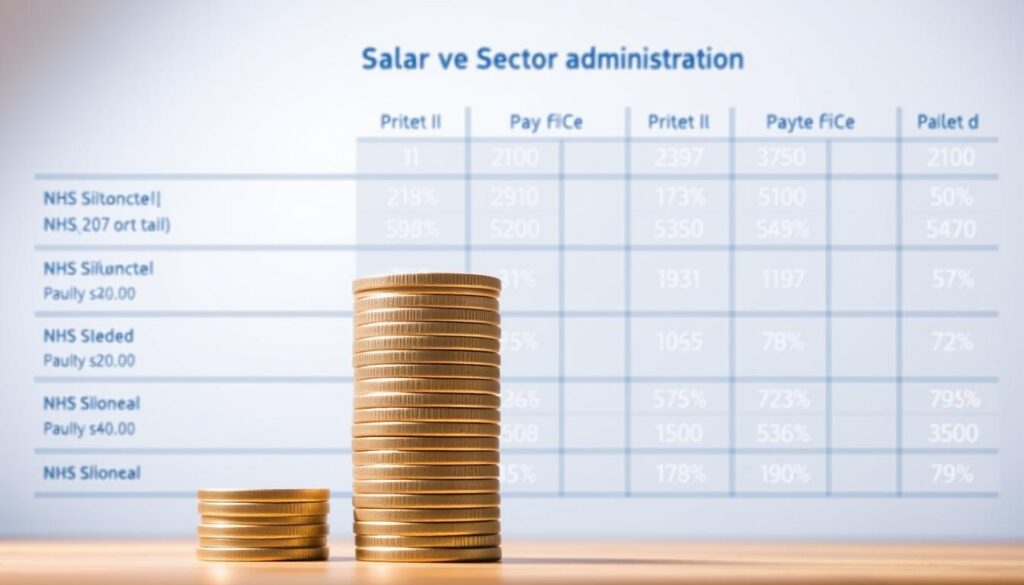Healthcare Jobs UK: Private Sector Medical Administration Roles Offering Better Pay Than NHS Positions

Are you considering a career change within the healthcare sector in the UK? The demand for healthcare professionals is on the rise, with forecasts suggesting a 40% increase in healthcare professionals by 2030, according to The Health Foundation.
You may find that private sector medical administration roles offer more lucrative opportunities compared to NHS positions. These roles are crucial in ensuring the smooth operation of healthcare services, and their importance is growing as the healthcare industry expands.
Key Takeaways
- The UK’s healthcare sector is experiencing significant growth.
- Private sector medical administration roles are in high demand.
- These roles often offer better pay than equivalent NHS positions.
- A career in private sector medical administration can be rewarding.
- The demand for skilled professionals is expected to rise.
The Current Landscape of Healthcare Jobs UK
The landscape of healthcare jobs in the UK is shifting, with private sector medical administration roles increasingly offering better pay than their NHS counterparts. This change is driven by the growing demand for private healthcare services and the subsequent rise in medical administration roles.
NHS vs Private Sector: Employment Statistics
The NHS remains the largest employer in the UK healthcare sector, with a vast workforce across various roles. In contrast, the private sector, while smaller, is growing rapidly. Key statistics include:
- The NHS employs over 1.2 million staff, making it one of the largest employers globally.
- The private healthcare sector in the UK is estimated to employ around 200,000 staff.
- Private sector healthcare jobs are growing at a rate of 3% annually, outpacing NHS job growth.
Growing Demand for Medical Administration Professionals
The demand for skilled medical administration professionals is on the rise, driven by the need for efficient healthcare management. This growth is evident in both NHS and private sectors, but private sector roles often come with better salaries and benefits.
Salary Disparities Between Sectors
While the NHS offers a structured pay scale, private sector healthcare roles often provide higher salaries, particularly in medical administration. For instance:
- Private sector practice managers can earn between £45,000 and £65,000 per annum.
- Medical secretaries in private clinics can earn up to 20% more than their NHS counterparts.
These disparities are making private sector roles increasingly attractive to healthcare professionals looking for better remuneration and career advancement opportunities.
Why Private Sector Medical Administration Roles Pay Better
The private sector offers more lucrative salaries for medical administration roles compared to the NHS, but what drives this disparity? Several key factors contribute to the higher pay scales in private sector medical administration.
Funding Structures and Budget Allocation
Private healthcare providers have different funding structures and budget allocations compared to the NHS. This allows them to offer more competitive salaries to attract top talent.
Profit Margins and Commercial Priorities
The profit motive in the private sector drives pay scales. Commercial priorities dictate that private healthcare providers must offer salaries that attract and retain skilled professionals.

Competition for Skilled Professionals
The demand for skilled medical administration professionals is high across both NHS and private sectors. To compete effectively, private healthcare providers offer higher salaries.
Performance-Based Compensation Models
Many private sector healthcare organisations implement performance-based compensation models. These models incentivise employees by offering financial rewards for meeting or exceeding performance targets, contributing to higher overall salaries.
In summary, the combination of different funding structures, profit margins, competition for skilled professionals, and performance-based compensation models all contribute to the higher pay scales in private sector medical administration roles. These factors enable private healthcare providers to offer salaries that are often significantly better than those available in NHS positions.
Top 10 Private Sector Medical Administration Roles with Higher Salaries
Several medical administration positions in the private sector offer higher pay than their NHS counterparts. If you’re considering a career change or looking to advance in the healthcare industry, these roles are worth exploring. Here are some of the top private sector medical administration positions that offer competitive salaries.
Practice Managers
Practice Managers oversee the day-to-day operations of private medical practices. With salaries ranging from £45,000 to £65,000, this role is both challenging and rewarding. Effective practice managers are essential for ensuring smooth operations and high-quality patient care.
Medical Secretaries in Private Clinics
Medical secretaries play a crucial role in private clinics, handling administrative tasks and patient communications. Their salaries typically range from £28,000 to £35,000. Excellent communication skills are vital for success in this position.
Healthcare Operations Directors
Healthcare Operations Directors are responsible for managing the operational aspects of private healthcare facilities. With salaries between £70,000 and £90,000, this is a highly sought-after role that requires strong leadership and management skills.
| Job Title | Salary Range (£) |
|---|---|
| Practice Managers | 45,000 – 65,000 |
| Medical Secretaries in Private Clinics | 28,000 – 35,000 |
| Healthcare Operations Directors | 70,000 – 90,000 |
| Patient Services Coordinators | 30,000 – 40,000 |
| Medical Billing Specialists | 35,000 – 45,000 |
| Private Hospital Administrators | 40,000 – 55,000 |
Patient Services Coordinators
Patient Services Coordinators facilitate patient care and administrative processes in private healthcare settings. Their salaries range from £30,000 to £40,000. Compassionate and organized individuals excel in this role.
Medical Billing Specialists
Medical Billing Specialists handle the financial aspects of patient care, ensuring accurate billing and coding. Salaries for this role range from £35,000 to £45,000. Attention to detail is crucial for success in medical billing.
Private Hospital Administrators
Private Hospital Administrators manage the overall operations of private hospitals. With salaries between £40,000 and £55,000, this role requires strong administrative and leadership skills.
These roles represent some of the top opportunities in private sector medical administration, offering competitive salaries and the chance to make a meaningful impact in healthcare.
Detailed Salary Comparison: NHS vs Private Sector Positions
Salary comparisons between NHS and private sector healthcare positions show that private sector jobs often offer better pay. This disparity is evident across various career stages and regions in the UK.
Entry-Level Positions: Up to 20% Difference
For entry-level positions, private sector healthcare jobs can offer salaries up to 20% higher than their NHS counterparts. This difference can significantly impact a professional’s decision to choose between sectors.
Mid-Career Roles: 15-30% Higher in Private Sector
Mid-career professionals in healthcare administration can expect salaries in the private sector to be 15-30% higher than those in the NHS. This premium reflects the private sector’s need to attract and retain skilled professionals.
Senior Management Positions: Significant Premium
Senior management positions in the private sector often come with a significant salary premium compared to NHS roles. This difference is largely due to the commercial priorities and profit margins of private healthcare providers.
Regional Salary Variations Across the UK
Regional variations in salary are also noteworthy, with certain areas offering higher salaries in the private sector compared to the NHS. For instance, London and the South East tend to have higher average salaries across both sectors.
| Career Stage | NHS Average Salary (£) | Private Sector Average Salary (£) | Percentage Difference |
|---|---|---|---|
| Entry-Level | 25,000 | 30,000 | 20% |
| Mid-Career | 40,000 | 50,000 | 25% |
| Senior Management | 70,000 | 90,000 | 28.6% |

Essential Qualifications and Skills for High-Paying Private Healthcare Roles
Private sector medical administration roles demand a unique blend of qualifications, technical skills, and soft skills. To excel in these high-paying positions, you’ll need to possess a combination of educational qualifications, technical expertise, and interpersonal skills.
Educational Requirements and Relevant Degrees
Many high-paying private healthcare roles require specific qualifications, such as degrees in healthcare management or related fields. For instance, a Master’s degree in Healthcare Administration or Business Administration can be highly beneficial. Some roles may also require professional certifications, such as the Certified Healthcare Executive (CHE) or the Certified Medical Manager (CMM).
Technical Skills: Healthcare IT Systems and Data Management
Technical skills are crucial in private healthcare administration. Proficiency in healthcare IT systems, such as electronic health records (EHRs) and practice management systems, is highly valued. Additionally, skills in data analysis and management can help you make informed decisions and drive business growth.
Soft Skills: Leadership and Patient Communication
Soft skills are equally important in private healthcare administration. Strong leadership and management skills can help you motivate teams and drive results. Effective patient communication is also critical, as it enhances patient satisfaction and loyalty.
Industry-Specific Certifications That Boost Your Value
Industry-specific certifications can significantly boost your career prospects in private healthcare administration. Certifications like the Certified Practice Manager (CPM) or the Fellow of the Institute of Healthcare Management (FIHM) can demonstrate your expertise and commitment to the field.
To succeed in high-paying private healthcare roles, focus on acquiring the necessary qualifications, technical skills, and soft skills. By doing so, you’ll be well-positioned to excel in this rewarding and challenging field.
Step-by-Step Guide to Transitioning from NHS to Private Sector
Transitioning from the NHS to the private sector can be a strategic career move for healthcare professionals. As you consider this transition, it’s essential to understand the steps involved in making a successful switch.
Step 1: Identify Your Transferable Skills and Experience
Begin by assessing your current skills and experience in the NHS. Highlight your achievements and qualifications that are relevant to private sector medical administration roles. Emphasize your ability to adapt to new environments and your understanding of healthcare operations.
Step 2: Research Target Private Healthcare Organisations
Research private healthcare organisations that align with your career goals. Look into their values, mission, and the services they offer. Understanding their needs will help you tailor your application and prepare for potential interviews.

Step 3: Build a Competitive CV Highlighting Commercial Awareness
Update your CV to highlight your commercial awareness and business acumen. Tailor your CV to showcase how your NHS experience can be applied to private sector roles. Include any relevant training or certifications that demonstrate your ability to work in a commercial environment.
Step 4: Develop Your Professional Network
Networking is crucial when transitioning to the private sector. Attend industry events, join professional associations, and connect with professionals already working in private healthcare. Building a strong network can provide valuable insights and job opportunities.
Step 5: Address Knowledge Gaps Through Training
Identify any knowledge gaps you may have and address them through additional training or certifications. This could include courses on healthcare management, business administration, or specific software used in private healthcare settings.
By following these steps, you can effectively transition from NHS roles to private sector medical administration positions, leveraging your skills and experience to secure better-paying roles.
Where to Find the Best Private Healthcare Administration Jobs
If you’re looking to transition into private healthcare administration, you’ll want to know where to find the best job opportunities. The good news is that there are multiple channels you can explore to discover top roles in this field.
Specialised Healthcare Recruitment Agencies in the UK
Specialised recruitment agencies can be a valuable resource in your job search. Agencies like Medacs Healthcare and Medical Recruitment Group focus on healthcare recruitment and often have exclusive access to job openings that aren’t advertised publicly.
Online Job Platforms and Industry-Specific Websites
Online job platforms are another effective way to find private healthcare administration jobs. Websites such as Indeed, LinkedIn, and HealthJobsUK frequently list a wide range of healthcare administration positions. You can also check industry-specific websites like Healthcare IT Jobs for roles that combine healthcare administration with technical skills.
Professional Networks and Healthcare Associations
Networking can play a crucial role in your job search. Joining professional associations like the Institute of Healthcare Management or attending events organised by the Healthcare Financial Management Association can help you connect with potential employers and learn about job opportunities.
Direct Applications to Private Healthcare Providers
Many private healthcare providers list their job openings on their own websites. Researching and directly applying to companies like Bupa, Nuffield Health, or Spire Healthcare can be an effective strategy, as it allows you to bypass recruitment agencies and apply directly to the hiring managers.
Recruitment Events and Healthcare Career Fairs
Finally, attending recruitment events and career fairs can provide valuable face-to-face interaction with potential employers. Events like the Healthcare Recruitment Expo offer a platform to learn about various job opportunities and get your CV noticed by key industry players.
By exploring these different channels, you can significantly enhance your chances of finding the best private healthcare administration jobs in the UK.
Application and Interview Mastery for Private Sector Medical Roles
To succeed in the competitive world of private sector medical roles, mastering the application and interview process is crucial. Your ability to showcase your skills and experience effectively can make all the difference in securing a position.
Crafting a Standout CV for Private Healthcare
Your CV is often the first impression you make on potential employers. To stand out, focus on highlighting relevant experience and skills that align with the job description. Use clear and concise language and ensure your CV is well-structured and easy to read.
Preparing for Competency-Based Interviews
Competency-based interviews are common in the private healthcare sector. Prepare by reviewing the job description and practicing responses to common questions. Focus on demonstrating your skills and experience in real-world scenarios.
Demonstrating Commercial Awareness and Business Acumen
Private sector healthcare organisations value commercial awareness. Show that you understand the business side of healthcare by discussing how your role contributes to the organisation’s overall goals and profitability.
Effective Salary Negotiation Strategies
When negotiating salary, research the market to understand the average salary range for your role. Be prepared to discuss your expectations and justify them based on your skills and experience.
Following Up After Interviews
After an interview, send a thank-you note or email to express your appreciation for the opportunity. This can help keep you top of mind for the interviewer and demonstrate your professionalism.
Benefits Beyond Salary in Private Healthcare Administration
Beyond the paycheck, private healthcare administration careers provide numerous additional advantages that can significantly enhance your overall job satisfaction and quality of life.
Comprehensive Healthcare and Insurance Packages
One of the most significant benefits of working in private healthcare administration is the comprehensive healthcare and insurance packages that often come with these roles. You can expect to receive high-quality medical insurance coverage, sometimes extending to family members, ensuring peace of mind for you and your loved ones.
Flexible Working Arrangements and Work-Life Balance
Private healthcare administration roles frequently offer flexible working arrangements, allowing you to achieve a better work-life balance. This can include options for remote work, flexible hours, or compressed workweeks, enabling you to manage personal and professional responsibilities more effectively.
Career Advancement and Professional Development Opportunities
The private healthcare sector is continually evolving, creating numerous opportunities for career advancement and professional development. You can expect access to training programs, workshops, and conferences that help you stay up-to-date with industry trends and enhance your skills.
Additional Perks: Pension, Bonuses, and Employee Discounts
In addition to salary and healthcare benefits, private healthcare administration roles often come with other attractive perks. These can include pension schemes, performance bonuses, and employee discounts on healthcare services or products, further enhancing your overall compensation package.
When considering a career in private healthcare administration, it’s clear that the benefits extend far beyond your basic salary, providing a comprehensive and rewarding employment experience.
Overcoming Challenges When Moving to Private Healthcare Roles
As you consider moving to private healthcare roles, you’ll need to be prepared to overcome several obstacles. The transition from NHS to private healthcare can be challenging, but being aware of the potential hurdles can help you navigate them successfully.
Adapting to Different Organisational Cultures
Private healthcare organisations often have different cultures and working environments compared to the NHS. You may need to adapt to a more commercial focus and flexible working arrangements.
Managing Increased Performance Expectations
Private healthcare roles often come with higher performance expectations. You’ll need to be prepared to meet these demands by developing your skills and working efficiently.
Balancing Commercial and Patient Care Priorities
One of the key challenges in private healthcare is balancing commercial priorities with patient care. You’ll need to find ways to maintain high-quality patient care while also meeting business objectives.
Addressing Job Security Concerns
Job security can be a concern when moving to private healthcare roles. However, many private healthcare organisations offer stable employment opportunities, and some even provide more job security than certain NHS roles.
Maintaining Professional Ethics in a Profit-Driven Environment
Maintaining your professional ethics in a profit-driven environment can be challenging. You’ll need to ensure that you continue to uphold the highest standards of patient care and confidentiality.
| Challenge | Strategy for Overcoming |
|---|---|
| Adapting to different organisational cultures | Be open to new ways of working and flexible in your approach. |
| Managing increased performance expectations | Develop your skills and work efficiently to meet demands. |
| Balancing commercial and patient care priorities | Find ways to maintain high-quality patient care while meeting business objectives. |
Conclusion: Making Your Move to Better-Paying Healthcare Administration Roles
With the demand for healthcare professionals on the rise, now is an opportune time to consider a career move to better-paying healthcare administration roles. As you’ve seen, private sector medical administration positions offer attractive salaries and benefits, making them an appealing alternative to NHS roles.
You can leverage your existing skills and experience to secure a better-paying role in the private sector. By understanding the key differences between NHS and private sector employment, you can make an informed decision about your career path. Whether you’re looking to boost your salary, advance your career, or simply find a more rewarding role, the private healthcare sector has much to offer.
Take the first step towards making a career move that aligns with your goals and aspirations. Explore the opportunities available in private healthcare administration and discover how you can thrive in this dynamic and growing field.
FAQ
What are the main differences in salary between NHS and private sector medical administration roles?
Private sector medical administration roles generally offer higher salaries compared to NHS positions, with differences ranging from 15% to 30% or more, depending on the role and level of experience.
What qualifications are required for high-paying private healthcare administration roles?
Typically, a relevant degree in healthcare management or administration is required, along with industry-specific certifications and strong technical skills in healthcare IT systems and data management.
How can I transition from an NHS role to a private sector medical administration position?
To transition, identify your transferable skills, research target organisations, build a competitive CV, develop your professional network, and address any knowledge gaps through training.
What are the most in-demand private sector medical administration roles?
Roles such as Practice Managers, Healthcare Operations Directors, Private Hospital Administrators, and Medical Billing Specialists are among the most sought after, offering salaries ranging from £28,000 to £90,000 or more.
How do I find private healthcare administration job opportunities?
You can find job opportunities through specialised healthcare recruitment agencies, online job platforms, professional networks, direct applications to private healthcare providers, and recruitment events.
What benefits, apart from salary, are typically offered in private healthcare administration roles?
Benefits often include comprehensive healthcare and insurance packages, flexible working arrangements, career advancement opportunities, pension schemes, bonuses, and employee discounts.
What challenges might I face when moving to a private healthcare role, and how can I overcome them?
Challenges include adapting to different organisational cultures, managing performance expectations, balancing commercial and patient care priorities, and maintaining professional ethics. You can overcome these by being flexible, developing your commercial awareness, and prioritising patient care.
Are there regional variations in salary for private healthcare administration roles across the UK?
Yes, salaries can vary significantly across different regions in the UK, with London and the South East often offering higher salaries compared to other areas.
How important is commercial awareness in private healthcare administration roles?
Commercial awareness is crucial as it enables you to understand the business aspects of healthcare, make informed decisions, and balance financial considerations with patient care priorities.